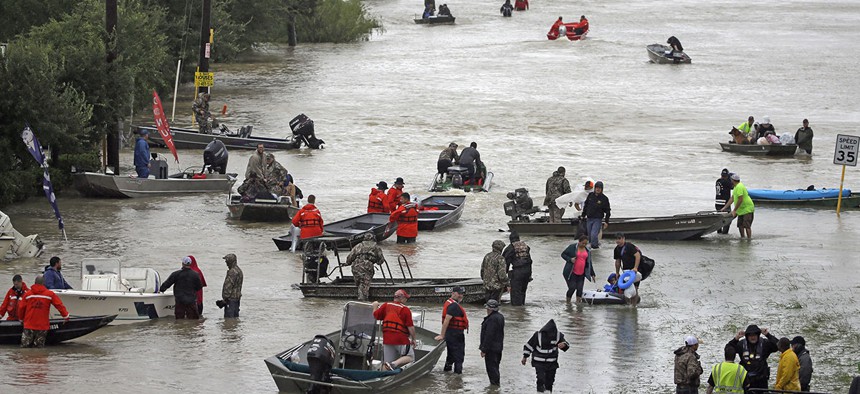A Three-Day-Old Crowdsourcing Website Is Helping Volunteers Save Lives in Hurricane-Hit Houston

Rescue boats fill Tidwell Road as they help flood victims evacuate as floodwaters from Tropical Storm Harvey rise Monday, Aug. 28, 2017, in Houston. David J. Phillip/AP
The site lets people in need register their location.
On the night of Sunday, Aug. 28, Matthew Marchetti was one of thousands of Houstonians feeling powerless as their city drowned in tropical storm Harvey’s deluge.
By Monday morning, the 27-year-old developer, sitting in his leaky office, had slapped together an online mapping tool to track stranded residents. A day later, nearly 5,000 people had registered to be rescued, and 2,700 of them were safe.
If there’s a silver lining to Harvey, it’s the flood of civilian volunteers such as Marchetti who have joined the rescue effort. It became pretty clear shortly after the storm started pounding Houston that the city would need their help. The heavy rains quickly outstripped authorities’ ability to respond. People watched water levels rise around them while they waited on hold to get connected to a 911 dispatcher. Desperate local officials asked owners of high-water vehicles and boats to help collect their fellow citizens trapped on second-stories and roofs.
The good news is that many people stepped up; the bad news, that it’s difficult—and risky—to rapidly coordinate and deploy the overflow of good intentions from a disparate group of non-professional rescue workers.
In the past, disaster volunteers have relied on social media and Zello, an app that turns your phone into a walkie-talkie, to organize. A few minutes on one of the Harvey-associated Zello channels is enough to realize how it can save lives. Here’s an exchange caught on one of them on Tuesday afternoon about a woman who had gone into septic shock:
-The lady is in bad shape. Does anybody know where the hospital’s at?
-What’s the current location?
-We’re at the Motorsport Park, the Houston Motorsport Part.
(A few moments later)
-Anyone on where the hospital’s at?
-We are currently working on that.
-9813 Memorial Boulevard, Humble, Texas
The volunteer dispatchers then dictated precise driving instructions.
Still, Harvey’s magnitude, both in terms of damage and the number of people anxious to pitch in, also overwhelmed those grassroots organizing methods, says Marchetti, who spent the spent the first days after the storm hit monitoring Facebook and Zello to figure out what was needed where.
“The channels were just getting overloaded with people asking ‘Where do I go?'” he says. “We’ve tried to cut down on the level of noise.”
The idea behind his project, Houstonharveyrescue.com, is simple. The map lets people in need register their location. They are asked to include details—for example, if they’re sick or have small children—and their cellphone numbers.
The army of rescuers, who can also register on the site, can then easily spot the neediest cases. A team of 100 phone dispatchers follows up with those wanting to be rescued, and can send mass text messages with important information. An algorithm weeds out any repeats.
It might be one of the first open-sourced rescue missions in the U.S., and could be a valuable blueprint for future disaster volunteers. (For a similar civilian-led effort outside the U.S., look at Tijuana’s Strategic Committee for Humanitarian Aid, a Facebook group that sprouted last year when the Mexican border city was overwhelmed by a wave of Haitian immigrants.)
Tuesday afternoon, members of the Cajun Navy, a group of veteran volunteer boaters, were using Houstonharveyrescue.com’s case numbers to track operations. Rescuers on call were directed to an apartment complex where a group of four adults were surrounded by water. A few hours later, the case had been scratched off the list.
Crowdsourcing a disaster response is not without risks, Marchetti admits. It can be dangerous for untrained volunteers. He’s heard from people willing to wade through the dangerous waters on foot, and out-of-towners setting off for the Houston chaos without a plan. The Harvey rescue site has a big disclaimer up top:
houstonharveyrescue.com is not liable for damages, including loss of life, limb, or property. This website is not affiliated with any government organization. It is a volunteer-run website. Please do not wait for rescue: if someone else shows up first, go with them! Rescues are not guaranteed. Call 911 for emergencies.
At this point, he said, more than the desire to help, what’s needed is experienced boaters and their vessels. “Our biggest problem is how to sift” those who know what they’re doing from those who don’t, he said.
Even for that challenge, though, there are volunteers signing up. The city, says Marchetti, has a big cadre of corporate chief executives who are providing free management advice on how to empower those who are equipped to help, and how to graciously decline the offers of those who aren’t.





